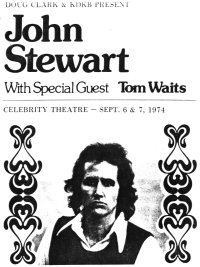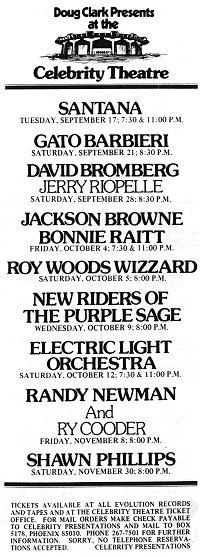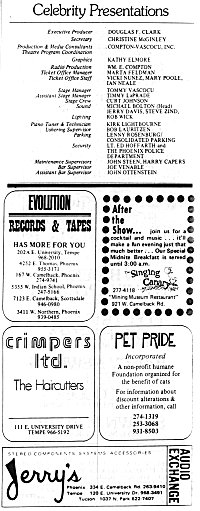 JOHN STEWART/SANTA MONICA CIVIC: ''It's hard to imagine anything
more traumatic for a singer-songwriter than putting out two albums with
the brilliance of California Bloodlines 1969) and Willard
(1970) and then not have them bring you anything more than a stack of good
reviews. The only answer when the sales and general recognition don't match
an album's quality is to have enough confidence in ourself to believe you
haven't yet done your best work and continue moving forward, hoping the
audience will catch up. That's what John Stewart has obviously done.
JOHN STEWART/SANTA MONICA CIVIC: ''It's hard to imagine anything
more traumatic for a singer-songwriter than putting out two albums with
the brilliance of California Bloodlines 1969) and Willard
(1970) and then not have them bring you anything more than a stack of good
reviews. The only answer when the sales and general recognition don't match
an album's quality is to have enough confidence in ourself to believe you
haven't yet done your best work and continue moving forward, hoping the
audience will catch up. That's what John Stewart has obviously done.
Though Stewart seems to have added some bits of rock to his former country
and folk-based style, he continues to deal with the issues that have always
been at the heart of his muisic. Stewart is a sort of obsessed romantic,
but his romantic concerns deal not only with matters of the heart, but
such topics as social progress, the country's heritage and man's freedom
of choice.''- Robert Hilburn, L.A. Times.
Stewart is a methodic, engaging performer who, via his warmth, can successfully transform the biggest of arenas into a "living room." And The Phoenix Concerts Live ( RCA CPL2 0265) is powerful proof of Stewart's magnetic charm. John Stewart is one of our most valuable singersongwriters. He's a weaver,
a colorful, descriptive storyteller , who offers us a panoramic view of
middle America. Like artist Andrew Wyeth, Stewart devotes most of his musical
paintings to the common man's struggle, focusing on the typical American
way of
Stewart's statements of social protest are subtle and provocative. His writing is many times witty, "Kansas Rain'' contains the memorable verse, "Standin' in line at the Bank of America/Nobody spoke they were in the House of God,' and most important, accessible. The Phoenix Concerts Live is a well-balanced blend of Stewart's best known masterpieces, some little-played but exquisite obscurities, and a batch of very compeling new tunes. Stewart's charisma just grabs his audience. Happily included are some of his best monologue bits he does to set up an upcoming number, and two "storyteller" songs which he partially narrates with tender emotion. An added treat is the background |
singing
of "Angel Rain" Buffy Ford. Stewart's vocal partner for an album recorded
seven years ago. "The Pirates of Stone County Road,'' a picturesque view of rural scenery, begins with Stewart drawling in his best Mid-Western accent. The song then dramatizes a young child's innocent fantasies and brings the listener into the child's own backyard. In the background, throughout intervals of the song, Buffy Ford, as the boy's elderly mother in her "high whicker chair," calls her son in for supper. Indeed, a marvehous selection. In ''Mother Country," the "dreams that belong to little boys'' are put
away by a reality that compels men and women alike to struggle for their
livelihood.
Then he swings into "Wild Horse Road." Once a song condemning greedy
rustlers who shot mustangs for profit, the song takes on an entirely different
context as Stewart sings, ''There ain't no wild horses out on wild horse
road." The final chorus is numbing, growing more intense with each repetition
of "Shoot all the brave horses/and how will we ride?'' An elaborate finale
with such heart-felt emotion; for John Stewart this was ''the last campaign."
|

|
